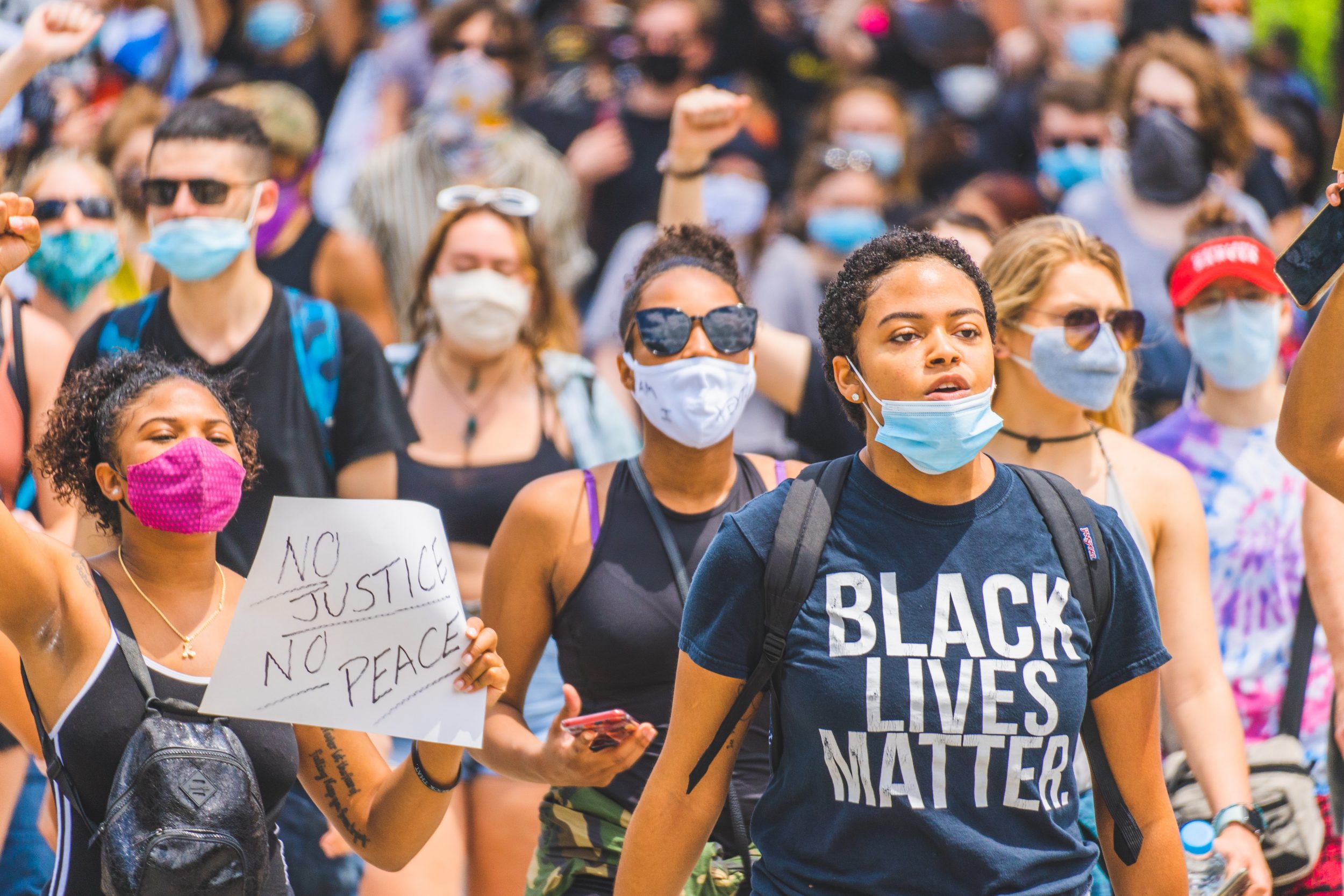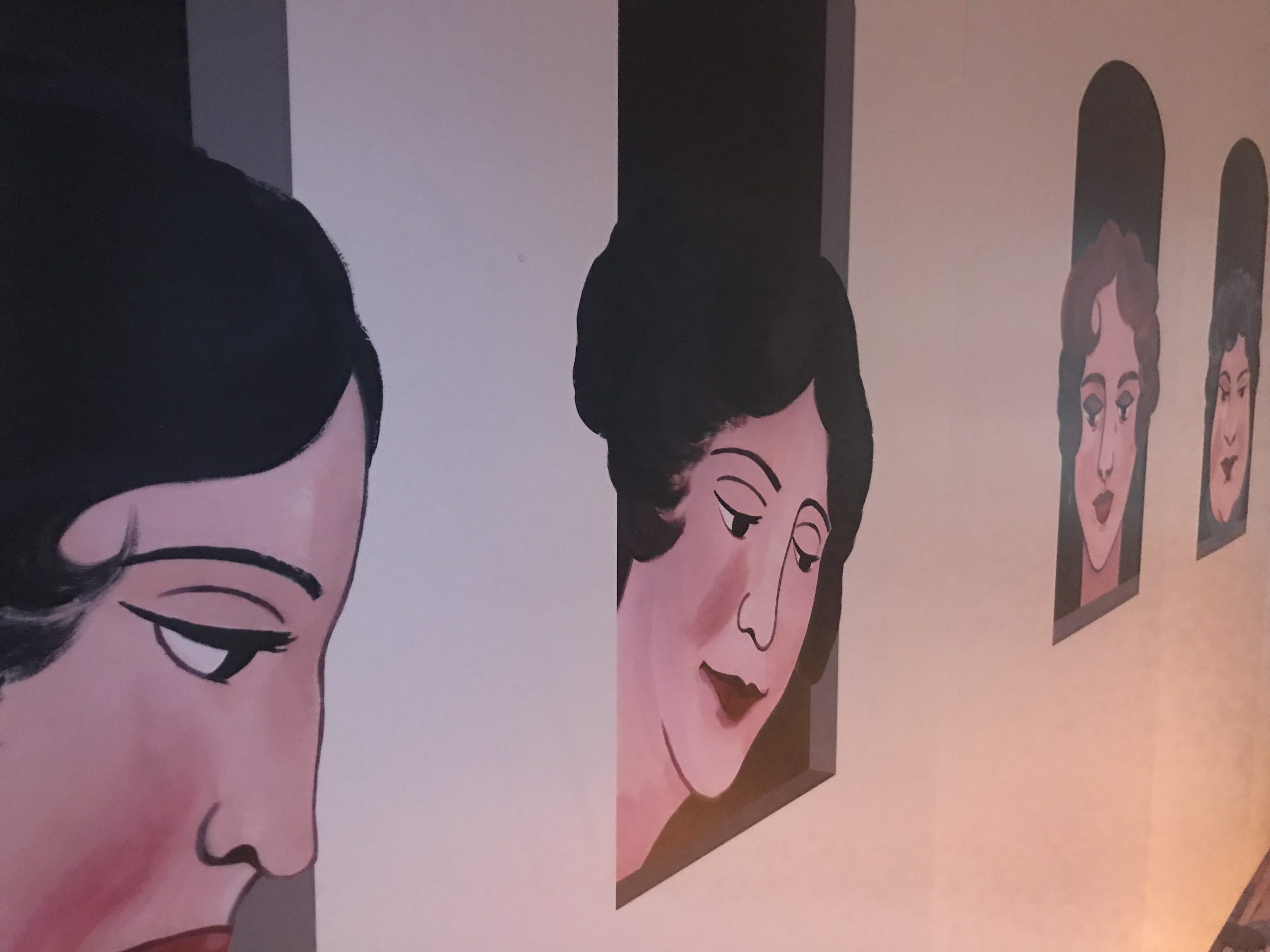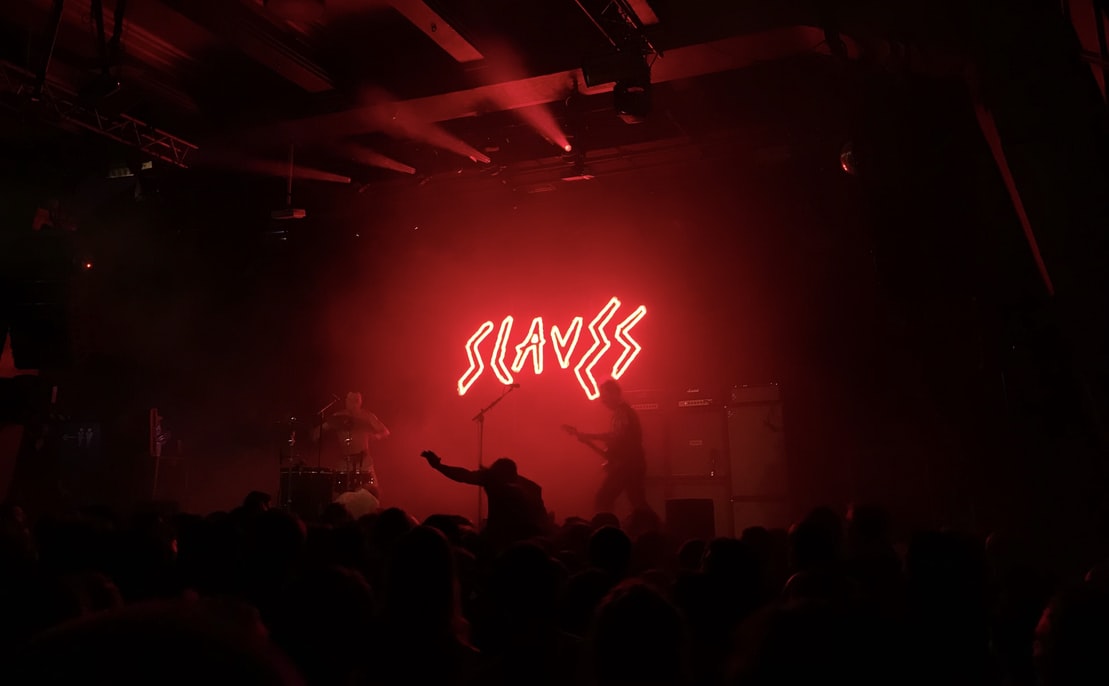 In an explosive interview with Oprah Winfrey aired this week, the Duke and Duchess of Sussex spoke candidly for the first time about the vitriol in the British press. Journalist and media researcher Ruhi Khan argues that there are striking parallels between media representation of powerful women – in the monarchy and Westminster – and explains why Meghan’s biggest allies in the UK are the women parliamentarians.
In an explosive interview with Oprah Winfrey aired this week, the Duke and Duchess of Sussex spoke candidly for the first time about the vitriol in the British press. Journalist and media researcher Ruhi Khan argues that there are striking parallels between media representation of powerful women – in the monarchy and Westminster – and explains why Meghan’s biggest allies in the UK are the women parliamentarians.
The staunchest supporters of the Hollywood celebrity Meghan Markle – who is married to British Prince Harry Windsor – on this side of the Atlantic are a set of powerful public figures who too constantly feel the barrage of sexist and racist comments by the British press. Seventy-two female Members of Parliament (MPs) had signed an open letter in October 2019 stating that British tabloids often carried ‘distasteful and misleading stories’ about Meghan and some of it displaying ‘outdated, colonial undertones’. Post the airing of the interview, they once again came out in support calling an end to press bullying.
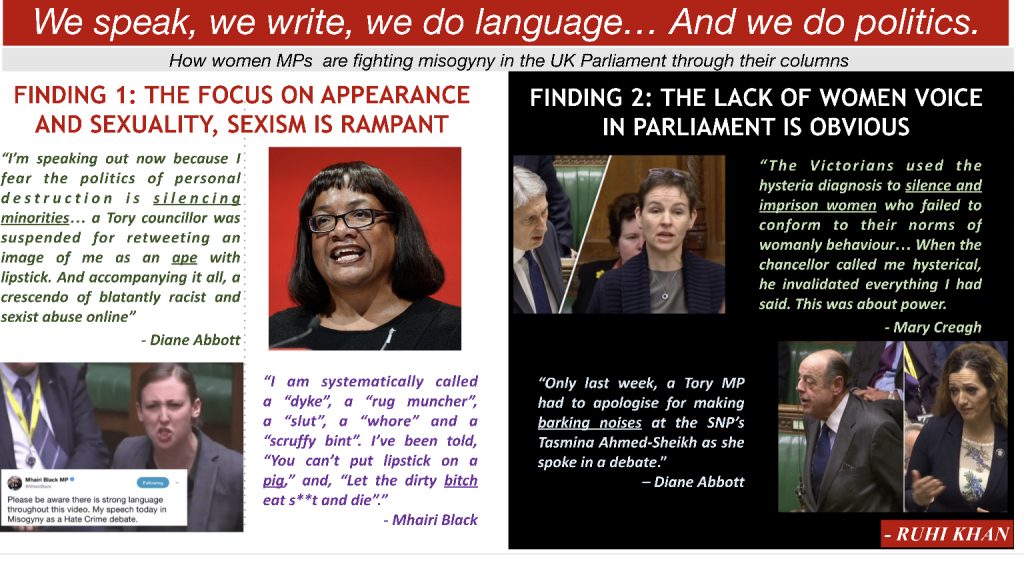 My research (see pictures) that studies the way female parliamentarians are standing up against biased, sexists and racist representation of women MPs in the British press and Westminster through their columns, resonates deeply with this bare-all interview where Meghan too raises issues of misogyny, sexism and racism in the British press and the monarchy. Both had grabbed onto opportunities to tell their stories with the least interference by the mainstream media.
My research (see pictures) that studies the way female parliamentarians are standing up against biased, sexists and racist representation of women MPs in the British press and Westminster through their columns, resonates deeply with this bare-all interview where Meghan too raises issues of misogyny, sexism and racism in the British press and the monarchy. Both had grabbed onto opportunities to tell their stories with the least interference by the mainstream media.
The highly emotional interview, aired in the UK on International Women’s Day, saw Meghan admit that her fairy tale marriage had quickly turned into a suffocating existence where her race and independence irked many who are tightly bound by the protocols of the monarchy and never accepted her within its fold. She felt that the ‘Firm’ (moniker for the Palace) did not protect her from hateful tabloids and at one point she even contemplated suicide. ‘If I didn’t tell Harry, I would do it. I just didn’t want to be alive anymore,’ Meghan confessed.
Harry and Meghan have had a rather tumultuous relationship with the most popular tabloids, even taking them to court for infringement of privacy, a case which they recently won. In April last year, they informed The Sun, The Daily Mail, Daily Mirror and Daily Express that they now have a policy of ‘zero engagement’. Harry confessed during the interview with Oprah that it was tabloid racism that forced the couple to leave Britain.
While the Sussexes felt abandoned by the Firm, Harry said he was deeply moved by the support Meghan received from over seventy women MPs in the UK, which also made it explicitly clear that no one from his royal family stood by her.
Having researched misogyny and sexism in UK press for some years now, the parallels between Meghan’s disclosure of the treatment by the tabloids and monarchy and those of the female MPs in the British press and Westminster became glaringly obvious:
Ridicule
In the twentieth century, women addressing the house in the Parliament were jeered, with ‘male MPs shouting “melons” and jiggling imaginary breasts’. In 2017, a Tory MP had to apologise for making barking noises at the SNP’s Tasmina Ahmed-Sheikh as she spoke in a debate, and words like ‘stupid woman’, ‘hysterical’ are regularly used to undermine the arguments made by women MPs.
It was little wonder that Meghan’s arch critic, TV personality Piers Morgan, declared the interview as ‘shameful’ saying that he expected ‘all this vile destructive self-serving nonsense from Meghan’. Morgan went on: ‘I’m sorry, I don’t believe a word she said, Meghan Markle. I wouldn’t believe it if she read me weather report.’ He was duly supported by business magnate and media personality Lord Sugar who also went on to call Meghan a liar. Several memes are also circulating in the cyberworld ridiculing the Duchess.
Bethan Sayed, a member of the Welsh parliament, tweeted a picture of how ITV’s Good Morning Britain picked four white men to critique the interview with a text that read: ‘5 men character assassinating a woman. No wonder Meghan left the UK.’
This need to ridicule Meghan was clearly visible when a couple of YouTube pranksters known for their social experiments paid four Royal correspondents to give their views on the interview before it was aired and discovered how they all (white men and women) ridiculed Meghan without even viewing the interview. In the video, the commentator and editor-in-chief of Majesty magazine, Ingrid Seward, called Meghan ‘an actress giving one of her great performances – from start to finish, Meghan was acting’.
This lack of believability, especially of a woman of colour, came to surface very clearly recently during the #MeToo movement, but it is not limited to issues of sexual harassment. It is determined by hierarchies of power, gender and race and has only accelerated in the ‘post-truth’ world.
Silenced
One of the significant moments in the interview was when Oprah asked Meghan if she ‘was silent or silenced’ to which Meghan admitted it was the latter. She was also unable to speak about her mental health crisis. Soon after the interview, MP Diane Abbott said she wanted the interview to signal to black and mixed-race women that they need not suffer in silence.
My research clearly shows that women MPs, much like Meghan, feel the system silenced their voice. Harriet Harman, one of the ten Labour MPs in 1982 when only 3% of MPs were women, says that ‘Women’s voices were not heard in parliament’ and Leanne Wood, former leader of Plaid Cymru asks: ‘How many voices have been silenced that we’ll never know about’?
Indifference
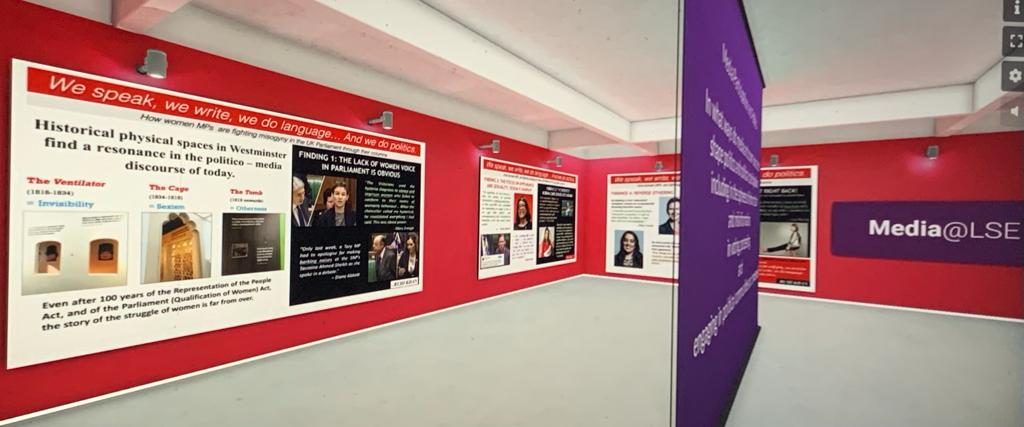 Women MPs found the Parliament stifling and indifferent to their needs especially health issues. MP Naz Shah, in her highly descriptive and emotive column on the ‘degrading’ experience of parliament’s archaic proxy voting process’ shows the reluctance and perhaps even the reckless attitude of the Tory whips to fail to take cognisance of Shah’s illness thus forcing her to enter the hall in a wheelchair and still attached to tubes.
Women MPs found the Parliament stifling and indifferent to their needs especially health issues. MP Naz Shah, in her highly descriptive and emotive column on the ‘degrading’ experience of parliament’s archaic proxy voting process’ shows the reluctance and perhaps even the reckless attitude of the Tory whips to fail to take cognisance of Shah’s illness thus forcing her to enter the hall in a wheelchair and still attached to tubes.
Meghan told Oprah that she had asked the senior Buckingham Palace officials for help when she had suicidal thoughts but they told her that this would damage the reputation of the monarchy. Harry admitted that the reason he was forced to leave UK was because he did not want ‘history repeating itself’ as he found his wife (like his mother) was being targeted by the tabloids for her charismatic personality and independent thinking and the Palace did not protect them, even with an invisible contract that exists between the tabloids and the Firm.
Sexism
In my research, it is clearly evident that women’s appearance, clothes and behaviour are scrutinised to typecast women MPs as ‘sex objects’. Most columns written by women MPs argue that women Parliamentarians are trapped in a media frame where the focus on their appearance and sexuality takes precedence over their mind. ‘Female MPs still routinely face direct, blatant sexism, criticised for the clothes we wear or how attractive we are and labelled shrill, lecturing or bossy when we stand firm,” says Lisa Nandy.
Similarly, Meghan was called Hurricane Megan ripping up the Palace rulebook on fashion and etiquettes. The press has analysed everything that Meghan has done wrong in her role as royalty – from the colour of her outfits to her (lack of) undergarments, from kissing Harry in public to walking barefoot on a beach.
Racism
Women MPs constantly face abuse from individual and groups often opposed to multiculturalism. Diane Abbott who entered politics to create a ‘narrative where a black woman could be a member of the UK parliament’, painstakingly points out in her column that she is routinely called ‘a bitch and/or n****r’ and receives ‘rape threats, death threats’ from far right groups.
Harry and Meghan told Oprah that while the Palace removed their security, even knowing that the threat perception against the them has not reduced (even after they stepped back from the position of senior royals), thus making them more vulnerable to the tabloid media and those that may wish them harm.
Headlines in the British tabloids glaringly show the disparity in the narrative frames adopted for Meghan and her-in-law Kate Middleton for similar news stories, clearly highlighting how racism plays out in newsprint. Undertones of racism have existed in articles and columns about how Meghan hails from ‘a gang-scarred home of her mother’ and how the ‘Windsors will thicken their watery, thin blue blood… with some rich and exotic DNA’
‘Rude and racist are not the same,’ said Meghan comparing attacks on herself to how tabloids covered Kate clearing alluding to the rampant misogynoir- the unique discrimination faced by Black women – in the British tabloid press.
Bullying claims made against Meghan, many argue are an extension of the micro-aggression due to her racial identity – ‘the world always believes black women bully, they believe black women intimidate’.
Meghan also revealed that while she was pregnant with Archie there were ‘concerns and conversations about how dark his skin might be when he’s born.’ This implicated a senior member of the royal family in the racism row, even though the couple refused to divulge a name.
Soon after the interview, Labour’s Nadia Whittome suggested that the claims of racism should be investigated by Buckingham Palace. Diane Abbott called it ‘the most extremely distasteful thing’ for somebody to say and said it was clear that monarchy ‘didn’t adjust well to having a mixed race woman marry into the royal family.’
Sisterhood
One theme that regularly emerges through my data is that of sisterhood. Women MPs support each other through their columns, tweets, letters and interviews; just like they did when the tabloid press turned against Meghan, and they are still doing when her interview to Oprah created a news-storm.
Politician Dr. Roshena Allin-Khan called Meghan ‘brave’ and asked the public to support ‘a mixed race woman talking about her mental health struggles during pregnancy’. MP Holly Lynch, who initiated the support letter in 2019, tweeted after the interview: ‘We expect the media to have the integrity to know when a story is in the national interest, and when it is seeking to tear a woman down for no apparent reason.’ She now leads the campaign against press bullying.
My research shows that by using self-representation that highlights personal experiences, thoughts and feelings, women politicians are changing the toxic press narrative by giving the British public a peek into who they really are.
Meghan Markle is doing the same.
This article represents the views of the author and not the position of the Media@LSE blog, nor of the London School of Economics and Political Science. To learn more about the LSE Department of Media and Communication’s research, please sign up to our Media@LSE newsletter here.



